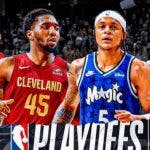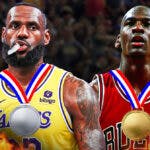In a perfect world, at least from the perspective of fans, LeBron James would have never left the Cleveland Cavaliers the first time. It isn't a perfect world, though. Not to mention the unrealistic expectation some have, which is that entitled feeling that a laborer never taking a job outside of the company in which you root for.
Of course, comparing LeBron leaving the Cavs to a Pepsi vendor leaving the soda company for Coca-Cola isn't an apples-to-apples scenario, but in the realm of capitalism and a free market, it boils down to the same thing — freewill, choice, individual value and so on..
The NBA is a bit weird in that regard, as players don't begin their careers in a true capitalistic market. Instead, while 99 percent of other professionals get to choose their first place of employment, players are drafted. There's no choice. Players have to do what they're told when entering each NBA Draft, or we otherwise call them selfish or some other slanderous negative that honestly doesn't accurately apply. While we can argue about the archaic model of drafting players for another time — and we will — guys in the NBA don't begin to wield any true power until their first free agency period hits.
For guys like LeBron James, however, the incredibly gifted to the point they transcend sports, the power can come earlier than that, even banging at the door of those who regularly have it (the owners) on an annual basis.
To be far more blunt, specifically in light of James leaving Cleveland for Los Angeles: Players owe franchises nothing. There's no inherent debt that comes with being forced to play for an owner out of college (or high school, overseas etc.) in which a player should be expected to pay back. The player, rather, should feel more like the owner owes him something. Without the player, especially one with the drawing power of LeBron, a guy like Dan Gilbert can see his franchise's value plummet and/or witness it become relatively irrelevant.
And yet, here's where things get trickier when discussing LeBron James. He's not merely some basketball player, as James represents far more than that to the people in Cleveland — some of it being real impacting stuff as the economy — and it could be argued no other city's fortunes, sports related or otherwise, were more directly intertwined than the one between James and the city he just left.

That's why, at least when talking about LeBron's legacy, we need to differentiate a remarkably important aspect in all of this. A line in the figurative distinction-sand. James and the Cavaliers, through all the highs and lows, is over… and it is actually no big deal. He did his time, for a lack of a better phrase, originally playing for a franchise he had no choice but to play for, then returned to Cleveland to help bring the city a title he promised it. Goal he didn't originally ask for, accomplished.
James' time with Cleveland, and its surrounding areas, is never over.
Somewhat lost in time, but getting clearer thanks to a more positive revisionist history, is that James' original The Decision raised money for charity. That he, through his own altruism alone, has continuously given back to the area no matter what uniform he is donning during whatever season he's attempting to win an NBA championship.

It is an aspect of James', as well as other professional athletes', career that will often go overlooked — as it is far sexier for a sports pundit to bang on a table and debate about the degree of clutch-gene (which isn't real) that resided within the comfy confines of his bones.
The legacy itself, in terms of basketball in Cleveland, is complete. He did the unthinkable; bringing a title to a city that desperately craved one. Couple that with years upon years of exciting play, with the hope James brought with him sprinkled all over the city on a yearly basis, and few NBA host cities could have asked for a better run.
It wasn't all pretty. The original Decision left a bad taste in people's mouths, and now there's likely a sense of disappointment looming over all the Witnesses who are watching their King leave for the west coast, but that's all natural, instinctive behavior which will go away with the passage of time.

LeBron James came back to the Cavaliers despite his owner, Dan Gilbert, quickly hurling his former player under the bus in the now famed Comic Sans fonted letter. He returned to a franchise after its fans had no qualms in burning his jersey when he left for the first time. Simply put, despite everything saying he didn't have to, he returned, made a promise, and gave everything to a franchise and its fan base without hesitation following a worse split than that time your best friend's parents go divorced.
He never left Cleveland, though. He's not born and raised in Los Angeles or a card carrying member of Miami. And, while he might have homes outside of Akron/Cleveland, the important work he does in making sure the youth of today has a chance for tomorrow has a focal point — his true home state.
It's a bitter feeling today, for sure. To see “your guy” go suit up for yet another NBA franchise. But that's all that is. LeBron James is donning another franchise's uniform, not a city's. He's still the kid from Akron, the dude who used a platform to raise money for the Boys and Girls Clubs of America, and a man who returned to a franchise he owed nothing in order to give the city he loved a professional title.
That's LeBron James' legacy with the Cleveland Cavaliers. A man better than the franchise itself, but a perfect fit for the city and its inhabitants. It also helps that, you know, it actually worked out… even if not in the traditional sense.



